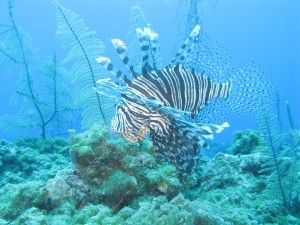 If you are planning to dive or snorkel the reefs on your next charter voyage to the Caribbean, Bahamas or Florida Keys you may encounter the astonishingly beautiful lionfish. Beware, the graceful profusion of colorful fins belies venomous spines that, although not known to be fatal, are extremely painful and can (rarely) come with severe complications. In addition, some scientists consider them as one of the top 15 threats to biodiversity worldwide.
If you are planning to dive or snorkel the reefs on your next charter voyage to the Caribbean, Bahamas or Florida Keys you may encounter the astonishingly beautiful lionfish. Beware, the graceful profusion of colorful fins belies venomous spines that, although not known to be fatal, are extremely painful and can (rarely) come with severe complications. In addition, some scientists consider them as one of the top 15 threats to biodiversity worldwide.
Lionfish are native to the Indo-Pacific region but in recent decades have invaded the waters of the Caribbean, the Bahamas, the east coast of the Americas as far north as Rhode Island, and as far south as Columbia. Their infiltration is likely the result of releases from tanks of saltwater hobbyists. With few known natural enemies, lionfish present a major threat to coral reef ecosystems as predators and competitors for food.
Humans are becoming the most lethal threat to date, as the fish emerges as a gourmet delicacy. Facebook groups promoting lionfish consumption include œI Spear Lionfish, œLionfish Derby and œEat the Lionfish. According to an article published by the Washington Post, July 7, 2010, chefs, spear fisherman and seafood distributors are plotting to eat the fish out of non-native existence. The REEF Environmental Education Foundation, a leading organization in the research and development of lionfish control programs, is preparing to publish a cookbook this fall on how to prepare the lionfish, described with a flavor between snapper and grouper.
What you should you do if you see the foot-long lionfish? They are glamorous and peaceful creatures, so use the photo opportunity. Otherwise, unless you are a savvy fisherman, or have the proper training and equipment, leave it alone but report the sighting location to the local island authorities and/or REEF when you surface.
Photo credit: REEF
Visit REEF Environmental Education Foundation: www.reef.org/lionfish
Lionfish Recipes: www.lionfishhunters.org/Recipes.html
www.washingtonpost.com/wp-dyn/content/article/2010/07/06/AR2010070601003.htm
